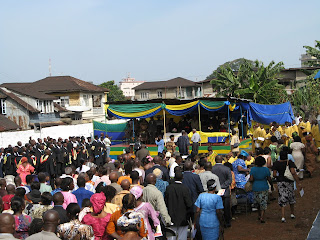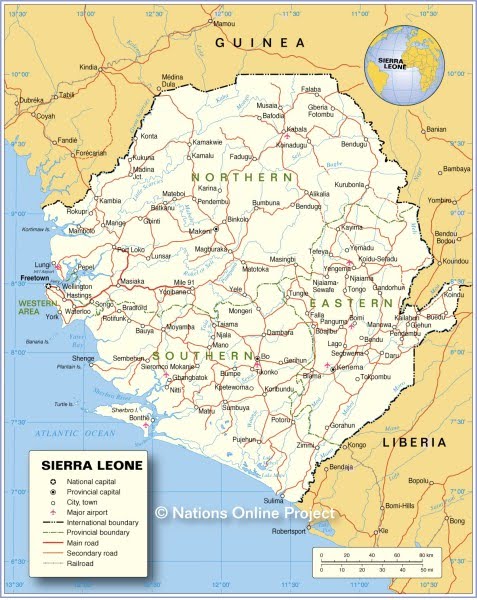Current discussions on the name of the college where we work, the Sierra Leone Theological College and Church Training Centre (SLTC &CTC), have involved the Minister of State for Education, as one of the questions has been of its appropriateness and accuracy – is it the only Theological College in Sierra Leone? If not, then what right has it to use the name Sierra Leone? In answer to the first question there are a number of other theological colleges in the country, representing various positions on the theological spectrum. But in her short speech at the opening service of the first semester of this academic year, Rev Dr Olivia A Wesley pointed out that SLTC is now working in Bo, Moyamba, Kono and Makeni, through its distance learning programme and so it has students throughout the country and therefore can justifiably lay claim to its name.
 SLTC & CTC is an ecumenical college, having been established by three historical denominations for the training of their ministers – namely United Methodists, Methodists, and Anglican churches. Since its foundation in 1985, the curriculum offered, and the scholarship achieved, has grown significantly. In addition to degree courses in theology, and Christian education, accreditation has just been received from the University of Sierra Leone for the course in community development. 35 years ago it would have been hard to imagine that students’ numbers would exceed 350 , and that the majority of them would be pursuing studies in administration, information technology, finance and peace studies at certificate and diploma levels.
SLTC & CTC is an ecumenical college, having been established by three historical denominations for the training of their ministers – namely United Methodists, Methodists, and Anglican churches. Since its foundation in 1985, the curriculum offered, and the scholarship achieved, has grown significantly. In addition to degree courses in theology, and Christian education, accreditation has just been received from the University of Sierra Leone for the course in community development. 35 years ago it would have been hard to imagine that students’ numbers would exceed 350 , and that the majority of them would be pursuing studies in administration, information technology, finance and peace studies at certificate and diploma levels.In 1985 all the students were from the three founding churches and situated in Freetown. Today the majority of the students come from independent African Initiated Churches, Pentecostal Churches and the Roman Catholic Church and some, are Muslims. This is also true of many of the teaching staff on the development, finance, and administration courses. This produces a diverse educational institution, where some courses are taught in a morning programme, but the major attendance is at evening classes, with community worship being an essential part of both programmes.
 We are now into the first semester of the new academic year, and like all education institutions the college has experienced the inevitable timetable clashes, confusion of people moving from one course to another, and the uncertainty as to who is to pay the students’ fees. Whilst support is expected from the founding churches, the college relies principally on students’ fees, with additional revenue being derived from late assignments, exam fees, repeat examination fees, graduation fees, library fees etc. The list seems endless.
We are now into the first semester of the new academic year, and like all education institutions the college has experienced the inevitable timetable clashes, confusion of people moving from one course to another, and the uncertainty as to who is to pay the students’ fees. Whilst support is expected from the founding churches, the college relies principally on students’ fees, with additional revenue being derived from late assignments, exam fees, repeat examination fees, graduation fees, library fees etc. The list seems endless.We are involved in both the morning and evening classes. Peter’s subjects for this semester range from The Gospels, to Christian Leadership and Church Administration, and Applied Theology, whereas Janice has English for Theology, Principles of Teaching, and Pastoral Action on HIV/AIDS. All of these subjects present challenges which need to be researched, as well ensuring that the methods used in the classroom do not conform to “I speak, you listen!!” In addition there are B.Th. dissertations and long essays to be supervised, as well as marking of
 these and other assignments. However, staff meetings are a rarity and almost all key decisions on functional matters (policy is controlled by the college’s board) are taken by a few key people and leaked rather than communicated.
these and other assignments. However, staff meetings are a rarity and almost all key decisions on functional matters (policy is controlled by the college’s board) are taken by a few key people and leaked rather than communicated.Last semester we were involved in the preparation of materials for Distance Learning, which pursues the principals of education by extension, for the benefit of those living in isolated urban and rural communities. It is both an important aspect of what the college is able to offer as well as a response to the growing number of students seeking to pursue study, whilst also having the security of work in aspects of nation building, at a distance from major urban conurbations.
Within the student population based Freetown there is a reasonable balance of males and females, who vary in age but have in common a keen sense of wanting to learn, understand, assimilate and apply what they are presented with. Their academic backgrounds vary, some with the equivalent of a West African A levels, whereas others already have a degree in another discipline. Very few are full time students, in that they are not in employment, whereas many more are already involved in full time ministry or others working in a variety of occupations. Our academic colleagues are all Saloneans, but there are only two women academic staff members, in addition to the principal. A team of administrative staff and another, offering logistical services (including carrying water up three flights of stairs), provide invaluable support to the various strands of college life. Whilst English is the ‘medium of instruction’, Krio is the lingua franca, for all sectors of the community. For both staff and students football is the common topic of exchange, regardless of the day of the week, with much more being known about the English Premier League than local football.
The college library has a collection of 30,000 books but as yet is lacking a computerised classification system. Reading is a habit that needs much encouragement, and acknowledgement has to be given to the fact that many of the students may not have electricity in their homes, that they have very limited space to work in, and that with the close proximity of housing, finding peace and quiet to study is not easy, where the expectation is that people will socialise in preference to reading a book alone.

Early on in each semester a staff gathering is held which all staff full and part-time are expected to attend, although all are present, the content focuses more on the academic aspect of what is often referred to as the college family. The meeting this semester was a refresher course on learner centred teaching and classroom management, unfortunately with little demonstration of the former from two well respected women in the Ministry of Education.
The college celebrates various events during the year including graduation, which takes place in an open space at the front of the college. Students have a uniform to wear for such events, and if graduating, western style academic gowns. A sports day, and football competition are ‘compulsory’ for all and excitement builds up around these events.
 The longer we are here, the more we find out about former staff members. On searching the bookshelves in the library, we came across a book by Margaret Baxter, a lecturer here in the 1980s. Thinking that we might find out more about her on the internet we discovered she had been awarded an OBE for her service to the community, in the New Year’s honours list, this year. The college hopes to produce a small publication to celebrate its 35th anniversary. One of the previous lecturers contacted is F Stuart Clark, and he too, we found, has a book in library.
The longer we are here, the more we find out about former staff members. On searching the bookshelves in the library, we came across a book by Margaret Baxter, a lecturer here in the 1980s. Thinking that we might find out more about her on the internet we discovered she had been awarded an OBE for her service to the community, in the New Year’s honours list, this year. The college hopes to produce a small publication to celebrate its 35th anniversary. One of the previous lecturers contacted is F Stuart Clark, and he too, we found, has a book in library.Given the diversity of the courses on offer, the possible impact that those who pass through the college may have on society, is great. With its motto “The light of the world”, it is hoped that through the graduates’ lives transformation of Salonean society will take place by the imparting of peace building knowledge, Christian ministry and social action.


Hi Peter and Janice - it's good to read more about your context there.
ReplyDeleteSome of our parishioners visited a CMS partner DISCET which is partly about counselling training. a number of Hull schools have links with schools in Freetown, but not much Adult Ed link that I know of.
We will be praying for you here - love Angela Bailey